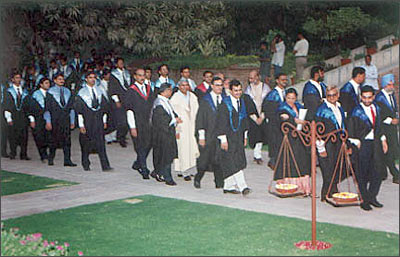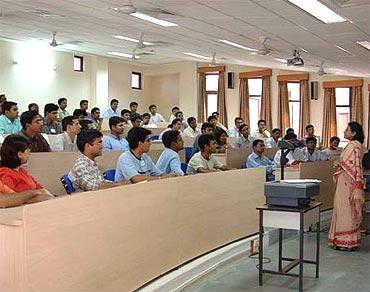Photographs: Rediff Archives Testfunda.com
Faculty of Management Studies has historically conducted its entrance test on the second Sunday of January -- a week after the XAT. It has broken the tradition this year by conducting the test a month in advance -- on December 5, 2010.
The table (below) clearly shows that the 4 sections remain consistent across the years but the level of difficulty in each section keeps varying. Keeping this broad framework in mind, you are best positioned to crack the FMS by preparing well across all sections.
Must know data
- 50 percentile in each section is the minimum qualifying score to get a call for the next round
- Questions range from 175 to 200 in numbers
- Allotted test time is 2 hours
- Each question has 4 options
- 4 marks are awarded for each correct answer and 1 mark is deducted for each incorrect answer.
- No sectional time limit -- you can choose to allocate time to each section based on your strengths
Change in approach
As the number of questions is high and the available time is 120 minutes, FMS has, over the years, tested the preparedness of even the most confident CAT-XAT takers.
On one end, a serious MBA aspirant prepares for questions that check the decision-making capabilities in CAT while XAT questions are more application and inference based.
At the other, he is expected to be very good at finer nuances of actual knowledge of English, Math and Reasoning. A change in approach is what will help bridge this need-gap. Although there is not much time left, the best way to get FMS-ready is to take 3 to 4 FMS mock papers.
This will help you get a feel of how you will fare in the real test, and thereby enable you to tweak your test-taking accordingly.
Last three years' FMS exam at a glance:


From cracking CAT to FMS: Change your strategy
Sectional strategy: Reading comprehension
Passages here are 750 words to 2,500 words long. The topics range from philosophy to finance to microbiology to intellectual property rights. They are manageable even if you are not very comfortable with the topic under consideration.
Although a few inferential questions do make an appearance, there are enough direct questions that will help you sail through the section. For example: In FMS 2010, there was a 7-page passage with 24 questions on business studies.
18 out of these 24 questions were direct -- you needed to simply locate the key word in the passage and get the answer.
Change in approach
If you were open to change from CAT-XAT (where a complete understanding of the entire passage is very important and hence reading the passage first makes sense), the best approach for FMS would be to read the questions first, and then go about locating the answer in the passage.
As your focus would be on attempting more direct (than implied) questions, the habit of reading the passage first may simply take away precious time in a 2 hour 200 question test.
Things to do right now
- Read on the topics mentioned in the 3-year analysis table in the first slide for RC. Try and read at a pace to become comfortable with speed-reading (which would have taken a back seat during CAT preparation).
- Quickly find (and make a mental note of/ underline) the keywords and gist of each of the paragraphs of the article you are reading.
- Solve 1 lengthy RC passage a day till your FMS.
- Time yourself: Not more than 60 to 90 seconds per question (including reading the passage).
From cracking CAT to FMS: Change your strategy
Verbal ability
A large chunk of Verbal Ability comprises synonyms & antonyms. FMS 2010 had 28 out of 50 questions in this section from Vocabulary.
Things to do right now
- Assuming you have practiced well for your grammar and verbal reasoning based questions during CAT, you will do well to browse through Barron's guide (only high frequency and high powered words) and TestFunda's daily word lists of 5 words a day.
- Play a lot of vocabulary building games online
- Even if you do not remember the exact meanings of the words, try to remember the sentences and contexts where they are used. Chances are you will be able to eliminate the incorrect options in the test.
From cracking CAT to FMS: Change your strategy
Logical and analytical reasoning
A large chunk of this section comprises caselets. Questions on data interpretation, blood relations, assumptions, input-output flow chart, arguments and syllogisms also make an appearance.
Change in approach
Data interpretation and data sufficiency are not as important here as in CAT & XAT. You may actually want to give a glance at these questions or skip them altogether with limited time at hand for your preparation. The assumption is that you would have prepared well for DI & DS questions for CAT and they will come naturally to you during the FMS mocks and actual test.
Things to do right now
- Practice as many and different varieties of caselets. This is your best bet to ace this section. TestFunda has FREE downloadable booklets on famous caselets: Mental agility quizzes and Puzzles.
- Quickly glance through a few solved examples on syllogisms, implicit statements and arguments under the Critical Reasoning topic. Please do not spend too much time as familiarising yourself with the question types is the goal here.
From cracking CAT to FMS: Change your strategy
Photographs: http://www.iimidr.ac.in
Quantitative ability
The questions are spread across different lessons and you can choose to concentrate on your strengths. Although higher math does make an appearance, you can score more in less time by attempting other question types.
Things to do right now
- Browse through the lessons that you have practiced for CAT and go through a few solved examples.
- Revise important formulae as a couple of questions can be solved very quickly by direct application of formulae.
Finally
- Do spend enough time to consolidate your strengths and understand your weaknesses by analysing every mock FMS you take. Go through the detailed analysis report and identify the play of speed and accuracy in your attempts.
- It will play a crucial role in helping you attempt or skip questions during the real test.
- Never forget that FMS is predominantly a test of speed. It is counter-productive to waste too much time on a question (no matter how challenging or intellectually satisfying) -- if you don't get it, move on.






Comment
article